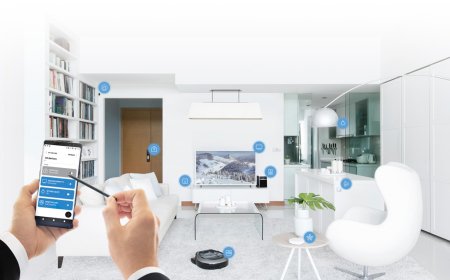Why AI Chatbot Development Is a Game-Changer for Your Business?
Discover how AI chatbot development can revolutionize your business by boosting customer engagement, streamlining operations, and increasing efficiency. Learn why it's a game-changer in today’s digital landscape.

In an era where digital transformation is more than a buzzword, businesses are constantly looking for ways to streamline operations, boost customer satisfaction, and increase efficiency. One technology that has emerged as a true game-changer is AI chatbot development. With advancements in natural language processing (NLP), machine learning, and cloud computing, AI chatbots have evolved from basic query responders to intelligent virtual assistants that can handle complex interactions.
If you're not yet leveraging AI chatbots, it's time to understand why this technology is not just a trend, but a competitive advantage.
1. 24/7 Customer Support Without the Overhead
Consumers today expect round-the-clock support. Traditional customer service models, which rely heavily on human agents, can't always meet this expectation without significant costs.
AI chatbots offer:
-
Instant responses: Unlike human agents, chatbots dont sleep or take breaks.
-
Scalability: Handle thousands of queries simultaneously without compromising quality.
-
Reduced operational costs: No need for large support teams working night shifts.
By deploying chatbots, businesses can ensure a consistent customer experience while drastically reducing staffing costs.
Real-world Example:
Sephora uses chatbots to offer beauty advice and product suggestions. Their bot, available 24/7, handles thousands of interactions daily, freeing up human agents for more complex tasks.
2. Improved Lead Generation and Sales Conversion
AI chatbots are not just for supporttheyre also powerful sales tools. Intelligent bots can:
-
Qualify leads by asking pre-screening questions.
-
Recommend products based on user behavior and preferences.
-
Offer promotional codes or upsell services in real-time.
Instead of waiting for a sales rep to follow up, chatbots engage visitors instantly, guiding them through the sales funnel.
Example:
Landbot.io, a chatbot development platform, has helped companies like Nestl create conversational landing pages that convert up to 4x better than traditional web forms.
3. Personalized Customer Experiences
Modern consumers value personalized experiences, and chatbots can deliver that at scale. By integrating with CRMs and databases, AI chatbots can:
-
Greet users by name.
-
Refer to previous interactions or purchases.
-
Tailor recommendations based on browsing history or user profiles.
This level of personalization not only boosts customer satisfaction but also increases loyalty and retention.
4. Streamlined Internal Operations
AI chatbots arent just for customersthey can significantly enhance internal efficiency by assisting employees.
Common use cases include:
-
HR bots: Answer questions about company policies, benefits, or leave balances.
-
IT support bots: Help with password resets, software installations, and troubleshooting.
-
Training assistants: Deliver bite-sized training modules or onboarding information.
By automating routine inquiries, businesses can allow employees to focus on high-value tasks.
5. Multilingual and Multichannel Support
AI chatbots can converse in multiple languages, making them ideal for global companies. Plus, they can be deployed across various platforms:
-
Websites
-
Mobile apps
-
WhatsApp
-
Facebook Messenger
-
Slack and other internal tools
This omnipresence ensures that users get help where and when they need iton the channel of their choice.
6. Data Collection and Actionable Insights
Every interaction with a chatbot provides valuable data. By analyzing chatbot conversations, businesses can:
-
Understand customer pain points.
-
Identify product or service gaps.
-
Detect frequently asked questions and areas of confusion.
-
Optimize marketing and sales strategies.
AI chatbots can even generate real-time reports and dashboards, providing actionable insights to drive strategic decisions.
7. Reduced Human Error
Even the best human agents can make mistakeswhether it's a misquoted price, delayed response, or forgotten follow-up. Chatbots, when properly programmed and trained, ensure consistency and accuracy in their responses. This reduces risk, improves compliance, and enhances trust in your brand.
8. Cost-Effective Customer Engagement
AI chatbot development may require upfront investment, but the long-term cost benefits are undeniable:
-
Lower support costs
-
Reduced churn due to faster resolution times
-
Higher conversion rates from personalized interactions
-
Improved employee productivity
Over time, this technology pays for itself and becomes a central part of a company's customer engagement strategy.
9. Continuous Learning and Improvement
Modern AI chatbots use machine learning to improve with every interaction. They learn from customer queries, adapt to new trends, and expand their knowledge base without constant reprogramming. This means your chatbot becomes more effective and intelligent over time.
Bonus: Integration with AI Technologies
AI chatbots can also integrate with other emerging technologies:
-
Voice assistants (like Alexa or Siri)
-
Recommendation engines
-
Sentiment analysis tools
-
Robotic process automation (RPA)
This opens the door to even more innovative use cases and a seamless, AI-powered business ecosystem.
How to Get Started With AI Chatbot Development
Ready to build your own chatbot? Heres a roadmap:
1. Define Your Goals
What do you want your chatbot to achieve?
-
Customer support
-
Sales enablement
-
Internal assistance
-
Data collection
2. Choose the Right Platform
Depending on your technical resources, you can:
-
Use no-code platforms (like Chatfuel, ManyChat, Landbot)
-
Hire a chatbot development agency
-
Build a custom solution with developers
3. Design the Conversation Flow
Work with UX designers or use conversational design templates to ensure your bot is intuitive and user-friendly.
4. Train Your Bot
Use existing FAQs, product manuals, and previous chat logs to train the chatbot. Integrate it with your CRM or knowledge base for real-time updates.
5. Test and Launch
Run pilot programs and gather user feedback before scaling across platforms.
6. Monitor and Optimize
Review analytics, improve scripts, and continually update the chatbot to keep it aligned with business goals and user expectations.
Conclusion
AI chatbot development isnt just a trendy tech adoptionits a strategic business move. Whether you're looking to improve customer support, increase sales, or optimize internal workflows, AI chatbots can deliver fast, intelligent, and scalable solutions that traditional systems simply cant match.
As AI continues to evolve, businesses that invest in chatbot technology now will be better positioned to innovate, grow, and lead in the years ahead. The question is no longer if your business should use an AI chatbotbut how soon you can get started.








































